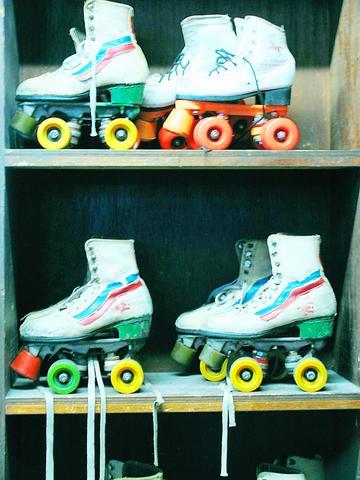Oh, for the days of roller skating! Teens gathering in a rink on Friday nights to put their hormones on wheels. All it took was a little help from Lionel Ritchie and those magic words: "Couples' skate. Couples' skate only, please." Hokey Pokey nothin' -- roller skating was about hanky panky.
But the Xanadu days of roller skating were squashed under the wheels of in-line skates. Now even in-line skating isn't cool unless it's "extreme" skating or "aggressive" skating. Decades ago, aggressive skating meant you were getting frisky with your date during couples' skate, not how many flights of stairs you could leap off.
Luckily, there is still a place where skating looks the way it used to. Jin Wan Nian Skating Rink (

PHOTO: DAVID MOMPHARD, TAIPEI TIMES
"There used to be other skating rinks," said Scott Chiang (
Several other rinks previously owned by Chiang's family in Taoyuan, Chungli, Hsinchu and Taichung have all closed.
Jin Wan Nian Skating Rink is located in Taipei's Ximending District at 6F, 70 Xining Rd. (
Those who prefer their skating outdoors and in-line should check out the skating park located adjacent to Zhongshan Soccer Stadium on Zhongshan North Road.

In recent weeks the Trump Administration has been demanding that Taiwan transfer half of its chip manufacturing to the US. In an interview with NewsNation, US Secretary of Commerce Howard Lutnick said that the US would need 50 percent of domestic chip production to protect Taiwan. He stated, discussing Taiwan’s chip production: “My argument to them was, well, if you have 95 percent, how am I gonna get it to protect you? You’re going to put it on a plane? You’re going to put it on a boat?” The stench of the Trump Administration’s mafia-style notions of “protection” was strong

Every now and then, it’s nice to just point somewhere on a map and head out with no plan. In Taiwan, where convenience reigns, food options are plentiful and people are generally friendly and helpful, this type of trip is that much easier to pull off. One day last November, a spur-of-the-moment day hike in the hills of Chiayi County turned into a surprisingly memorable experience that impressed on me once again how fortunate we all are to call this island home. The scenery I walked through that day — a mix of forest and farms reaching up into the clouds

With one week left until election day, the drama is high in the race for the Chinese Nationalist Party (KMT) chair. The race is still potentially wide open between the three frontrunners. The most accurate poll is done by Apollo Survey & Research Co (艾普羅民調公司), which was conducted a week and a half ago with two-thirds of the respondents party members, who are the only ones eligible to vote. For details on the candidates, check the Oct. 4 edition of this column, “A look at the KMT chair candidates” on page 12. The popular frontrunner was 56-year-old Cheng Li-wun (鄭麗文)

“How China Threatens to Force Taiwan Into a Total Blackout” screamed a Wall Street Journal (WSJ) headline last week, yet another of the endless clickbait examples of the energy threat via blockade that doesn’t exist. Since the headline is recycled, I will recycle the rebuttal: once industrial power demand collapses (there’s a blockade so trade is gone, remember?) “a handful of shops and factories could run for months on coal and renewables, as Ko Yun-ling (柯昀伶) and Chao Chia-wei (趙家緯) pointed out in a piece at Taiwan Insight earlier this year.” Sadly, the existence of these facts will not stop the